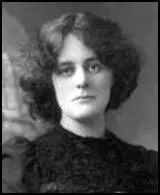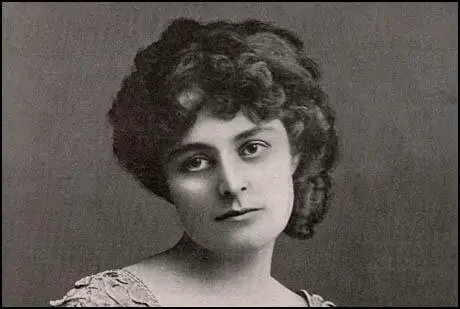Maud Gonne

Maud Gonne, the daughter of a colonel in the British Army, was born on 20th December, in Aldershot in 1865. After her mother's early death she was sent to be educated in Paris. Her father was from a wealth Irish family and in 1882 she joined him in Dublin.
Maude Gonne's father died in 1886 and left her financially independent. She returned to France where she met and fell in love with the radical journalist, Lucien Millevoye. Influenced by Millevoye's political views, Maud became involved in radical politics.
Maude Gonne moved to Ireland and settled in Donegal where she was active in the campaign to protect those evicted from their homes. This included building huts, fund-raising and writing to newspapers. Threatened with arrest, Maud fled to France in 1890 where she gave birth to Millevoye's child. While living in Paris she edited L'Irlande Libre, a monthly journal that promoted Irish independence.
In 1900 Maud Gonne ended her relationship with Millevoye and returned to Ireland where she founded the revolutionary group, the Daughters of Erin. The organization also produced the monthly journal, The Irish Woman, and she contributed several articles on feminist and political topics.
Together with William Butler Yeats Maude Gonne helped establish the Abbey Theatre in Dublin. Yeats fell in love with her and his feelings for her inspired a large number of poems. In 1902 Gonne played the leading role in his play, Kathleen Ni Houlihan.

In 1903 Maude Gonne married John MacBride, a major of the Irish Brigade. After giving birth to Seán MacBride, she joined Constance Markievicz, James Connolly and James Larkin in the campaign to force the authorities to extend the 1906 Provision of School Meals Act to Ireland. She also started a scheme to feed poor children in Dublin.
During the First World War Maud joined Constance Markievicz, Hanna Sheehy Skeffington and Kathleen Clarke in the campaign against the conscription of Irish men into the British Army.
On 5th May 1916 John MacBride was executed for his part in the Easter Rising. Maud continued to campaign against conscription and in 1918 she was arrested and interned in Holloway Prison in London.
After her release Maude Gonne returned to Ireland and worked for the White Cross, an organization that helped the victims of the War of Independence and their dependents. Together with Charlotte Despard she collected first-hand evidence of army and police atrocities in Cork and Kerry. The two women also formed the Women's Prisoners' Defence League to support republican prisoners.
In 1923 Maude Gonne was imprisoned without charge by the Free State government and was one of the 91 women who went on hunger strike while in prison.
Maude Gonne's son, Seán MacBride, also became involved in politics and in 1936 became Chief of Staff of the Irish Republican Army. In 1938, she published her memoirs, A Servant of the Queen.
Maud Gonne died at Roebuck, Clonskeagh, on 27th April, 1953 and afterwards was buried in the Republican Plot in Glasnevin Cemetery, Dublin.

